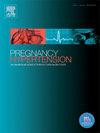子痫前期的产后护理:缺乏对长期后果的认识和咨询不足
IF 2.9
4区 医学
Q2 OBSTETRICS & GYNECOLOGY
Pregnancy Hypertension-An International Journal of Womens Cardiovascular Health
Pub Date : 2025-05-06
DOI:10.1016/j.preghy.2025.101220
引用次数: 0
摘要
背景子痫前期有长期的后果,增加心血管疾病的风险。目的评估womeńs对先兆子痫(PE)的了解,以及产后保健在多大程度上符合循证指南。方法一项横断面研究于2021年至2022年在巴西东南部的两家转诊妇产医院进行。妊娠期诊断为PE的妇女在分娩后数周内联系,并就住院时间、降压药使用情况、定期就诊、护理地点、参与产后护理的专业人员、血压监测和PE知识进行访谈。进行描述性分析。结果124名PE妇女被邀请参加研究,其中100名在产后6周回答了问卷,回复率为80%。大多数妇女年轻(20-34岁),主要是白人,多胎,有潜在的医疗条件。分娩方式以剖宫产为主(75%),早产率较高(75%)。半数患者住院时间为3 ~ 5天。所有妇女都被转介到初级保健,49%的人在产后第一周被建议进行预定的访问。大约三分之一的妇女在产后6周没有使用抗高血压药物。接受的主要咨询:维持血压测量(65%),药物管理(53%),随访(41%)和鼓励改变生活方式(35%)。然而,98%的妇女不知道PE的长期影响,只有35%的妇女在产后医疗护理中得到支持。结论缺乏早期专科护理,对子痫前期患者长期风险的指导不足。本文章由计算机程序翻译,如有差异,请以英文原文为准。
Postpartum care after preeclampsia: Lack of knowledge and inadequate counseling on long-term consequences
Background
Preeclampsia has long-term consequences, with an increased risk of cardiovascular disease.
Objective
To assess womeńs knowledge about preeclampsia (PE) and to what extent the postpartum healthcare provided was aligned with evidence-based guidelines.
Methods
A cross-sectional study conducted between 2021 and 2022, in two referral maternity hospitals in southeast Brazil. Women diagnosed with PE in the current pregnancy were contacted by weeks after childbirth and interviewed about the length of hospital stay, use of antihypertensive drugs, scheduled visits, place of care, professionals involved in postpartum care, blood pressure monitoring and knowledge about PE. A descriptive analysis was conducted.
Results
One hundred and twenty-four women with PE were invited to the study, and 100 answered the questionnaire six weeks postpartum, with a response rate of 80 %. Most women were young (aged 20–34 years), predominantly white, multiparous, and had underlying medical conditions. Route of delivery was predominantly cesarean section (75 %), with a high preterm birth rate (75 %). Half of hospital stays lasted 3–5 days. All women were referred to primary care and 49 % had a scheduled visit recommended during the first week postpartum. Around one-third of the women were not using antihypertensive medication 6 weeks postpartum. Main counselling received: maintenance of blood pressure measurements (65 %), management of medications (53 %), follow-up visits (41 %) and lifestyle changes were encouraged (35 %). However, 98 % of the women were unaware of the long-term repercussions of PE and only 35 % felt supported during postpartum medical care.
Conclusion
Early return to specialized care was lacking and guidance on the long-term risks after preeclampsia was inadequate.
求助全文
通过发布文献求助,成功后即可免费获取论文全文。
去求助
来源期刊

Pregnancy Hypertension-An International Journal of Womens Cardiovascular Health
OBSTETRICS & GYNECOLOGYPERIPHERAL VASCULAR-PERIPHERAL VASCULAR DISEASE
CiteScore
4.90
自引率
0.00%
发文量
127
期刊介绍:
Pregnancy Hypertension: An International Journal of Women''s Cardiovascular Health aims to stimulate research in the field of hypertension in pregnancy, disseminate the useful results of such research, and advance education in the field.
We publish articles pertaining to human and animal blood pressure during gestation, hypertension during gestation including physiology of circulatory control, pathophysiology, methodology, therapy or any other material relevant to the relationship between elevated blood pressure and pregnancy. The subtitle reflects the wider aspects of studying hypertension in pregnancy thus we also publish articles on in utero programming, nutrition, long term effects of hypertension in pregnancy on cardiovascular health and other research that helps our understanding of the etiology or consequences of hypertension in pregnancy. Case reports are not published unless of exceptional/outstanding importance to the field.
 求助内容:
求助内容: 应助结果提醒方式:
应助结果提醒方式:


